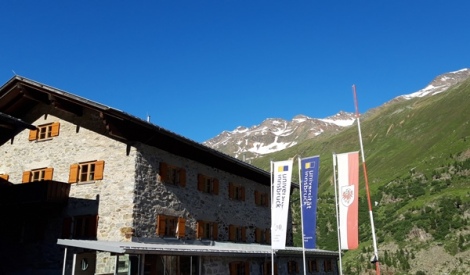
Innsbruck University Alpine Research Centre, Obergurgl, Austria
This final blog (of three) summarises diverse themes drawn from #oecsk2019. Overall, the three-day event showcased a wide range of projects and programmes using diverse formats to share content. The broader contexts in which citizen science takes place (e.g., policy, funding and education systems) as well as increasingly important considerations (e.g., data management, access and protection) are outlined here and in the two previous posts. I will be further investigating some of the topics raised in #oesck2019 when I travel again to Europe (and Hong Kong) in Sept/Oct 2019 on a Winston Churchill Memorial Trust Fellowship.
Blog #1 Borders, Frontiers, #CitSci definitions & Benefits
Blog #2 #CitSciNZ, Biodiversity monitoring & Co-design
On the second night of the conference, 6 participants were given 6 minutes each to summarise their science in a #scienceslam competition. Poetry, song, role-play, novel props (incl. balloons, ladders, pins, dried plants and pieces of wood inscribed with local sayings…) all formed part of a highly entertaining event. Science slams are one of many platforms designed to break down barriers between science and society, by allowing scientists to communicate their research in ways that intrigue, inspire and engage the public.
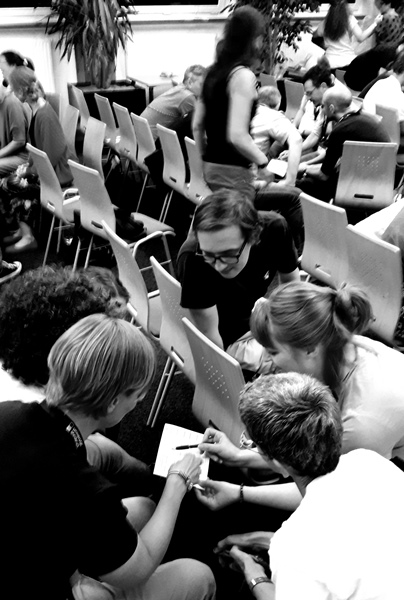
The challenging task of judging the science slam presentations
Designing a low threshold funding strategy
Funding for citizen science, or lack thereof, is a common theme. The German Ministry for the Environment had funds available (up to €25k) for citizen science but needed better methods for distribution. Again, co-design approaches were used (see #oecsk2019 Blog 2) to bring together diverse actors e.g., decision makers/funders, researchers, NGOs, educators and cit sci practitioners to develop an accessible funding strategy. Identifying both funder and user needs, funds were established at four different levels ranging from €1k to €25k (see the Position Paper here – in German only). Susanne Hecker (stepping in for Annett Richter, iDIV) highlighted how cit sci is poorly integrated into funding, with most sector-based rather than research question lead. This is supported by a study showing interdisciplinary research has consistently lower funding success than single discipline studies (see Bromham et al. 2016).
Open science, Open innovation
The starting point for the open science workshop (run by Daniel Spichtinger, Ludwig Boltzmann Gesellschaft and Susanne Blumesberger, University of Vienna) was ‘excellent data are integral to excellent research’. Data should be open by default rather than closed by default with sharing only occurring between peers. However, if data need to remain closed, researchers should to provide robust justification (e.g., awaiting a patent; threatened species etc.)
Overall, the principles of open data are better understood and more widely used than FAIR. The following table (adapted from the workshop presentation) outlines considerations of each FAIR component:
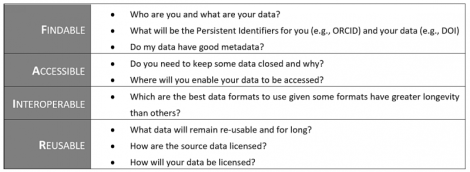
FAIR principles for data
A focus of the presentation was the development of a data management plan. Susanne Blumesberger described how she works with researchers at the University of Vienna to document their data. Dialogues ideally take place at the research project development stage, to ensure best strategies are put in place for managing data in the long-term through the University’s own online system.
Data responsibility
To raise the awareness of the cit sci coordinators and developers of online cit sci projects, Philip Hummer (Spotteron developer and citizen scientist) outlined the risks and responsibilities of using open source software. He emphasized that ultimately project coordinators are responsible for data management and protecting user data.
- External services integrated in the home page – you tube, google analytics, chat tools – why are they free? So that data can be recycled – develop data profiles of users
- Open source CMS (e.g., Joomla, WordPress, Drupal) as well as smartphone apps etc. Where does SPAM come from….? Happens when you don’t continually update as bugs are constantly appearing.
- Protection of personal data – privacy concerns
He urged attendees to use Ghostery to reveal how many tracking technologies are in use on attendees’ project pages.
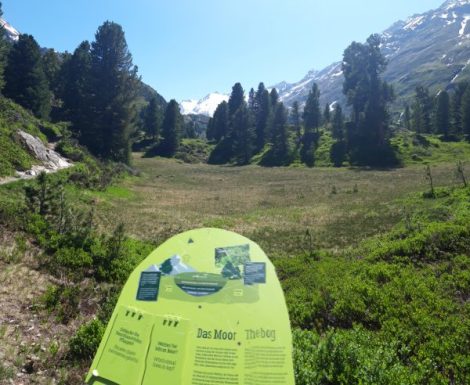
Alpine bog and interpretation panel in the Zirnwald protected area
Gamification
‘Gamification’ is the development game-like approaches to collecting and analysing data, and can enhance research and learning. Games like Pokemon Go, can be enormously popular because they tap into human desires and needs and are fun to use. Tools such as Locandy can be used to develop games (see The Walk of Science: Biodiversity in the Alps) that are both educational and entertaining. The integration of smart sensors allows a greater range of data to be collected and locations to be triangulated.
In another project, researchers at Explore AT collaborated with Spacelab_girls to co-design an app to help measure the food type intake, water consumption and levels of sport – a more up to date and engaging take on a Ministry-led food pyramid app. Co-design involved 3 workshops: (1) problem identification and game concepts, (2) prototype(s) testing and further development and, (3) a final collaborative evaluation.
Spacelab_girls participants wanted instant feedback. To enhance their user experience, a timer and weekly components were included. The appearance of an energy drink = ‘game over’(!). Different seasonal levels are included along with an avatar that could be personalised. The process was not without challenges: finding a common language; fluctuating levels of participation and motivation and the inability to carry out a full evaluation to better understand the participants’ experience of the project.
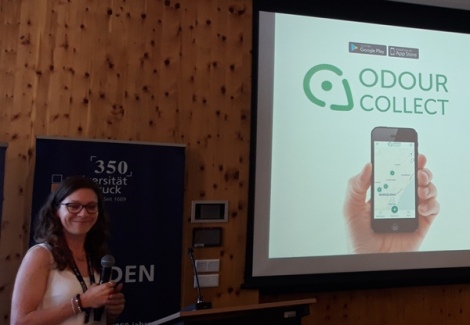
The ‘Odour Collect’ app from the mulit-country EU-funded D-NOSES project
Socio-cultural citizen science
A key difference between cit sci in Europe, the US and NZ, is the expansion of socio-cultural projects and programmes. Notable was the focus on language and dialect (one of the challenges I faced at the conference!) One project, I am DiO – in alle Münde und in aller Köpfe, investigated how the German language in Austria is used and perceived as well as how it has been influenced by other languages. One component is linguistic landscaping, achieved in this project by a ‘Schnitzel jagd’ where participants photograph signs and lettering in public spaces to build a record of how language changes over time.
Another ethnographic project Stadt-Land-Kind (City-Country-Child) used the Austrian Museum of Folklore photo archive to explore cultural identity though intergenerational dialogs.
Simone Ruefenacht (ECSA) presented D-NOSES (#dNosesEU), a project both with socio-cultural and environmental dimensions. 10 Pilot studies, some already underway are planned as a large trans-country initiative to collect and map odours through a fee app. There are compelling implications if initiatives in the US (as narrated by Caren Cooper in her excellent book on Citizen Science) are anything to go by.

Alpine coffee
This wraps up the blog series on the conference. Any questions, queries or comments – don’t hesitate to make contact.
Further reading
Bromham, L., Dinnage, R., & Hua, X. 2016. Interdisciplinary research has consistently lower funding success. Nature 534(7609): 684
Cooper, C. 2017. Citizen Science – How ordinary people are changing the face of discovery. The Overlook Press, NY. 294pp.
Ethics for researchers – http://ec.europa.eu/research/participants/data/ref/fp7/89888/ethics-for-researchers_en.pdf
European code of conduct for researchers – https://www.allea.org/publications/joint-publications/european-code-conduct-research-integrity/
Fecher, B. Leimüller, G., & Blümel, C. 2018. Das Potenzial strategischer Öffnung (The Future of the German Science and Innovation System). Stifterverband DOI: 10.5281/zenodo.1246652 (in German). Available from https://www.stifterverband.org/medien/potenzial-strategischer-oeffnung
Richter, A. et al. 2018. Position paper (in German only) Handlungsbedarfe und Maßnahmen für die Förderung von Citizen Science in der Umweltbildung und Umweltkommunikation. Helmholtz-Zentrum für Umweltforschung GmbH – UFZ https://www.ufz.de/export/data/2/216550_BMU_Positionspapier_CS_Foerderung.pdf
The State of Open Data 2018 – Annual report https://www.digital-science.com/resources/portfolio-reports/state-open-data-2018/

Thank you so much for blogging and recording the conference for those of us who couldn’t attend it. As all your blog posts – these reports are fantastic!
LikeLike
Well, you have raised the bar very high…!
LikeLike
Pingback: 5th Austrian #CitizenScience Conference – #CitSciNZ, Biodiversity monitoring & Co-design | monicalogues·
Pingback: #WCMT Citizen Science research trip: #Hackspace and social #citsci, London Day 2 | monicalogues·
Pingback: #WCMT Citizen Science research trip: ECSA, German #citizenscience platforms and networks | monicalogues·
Pingback: #WCMT Citizen Science research trip: Austrian #citsci infrastructure, Vienna Day 2 | monicalogues·